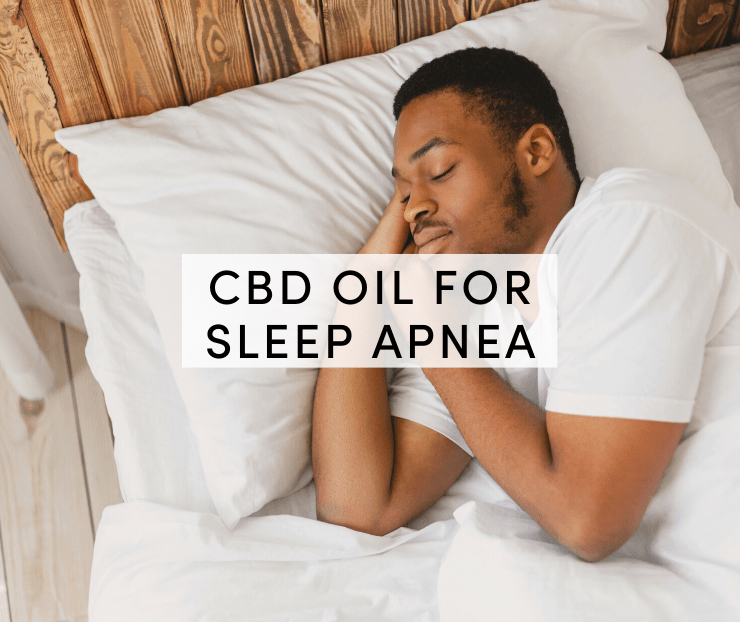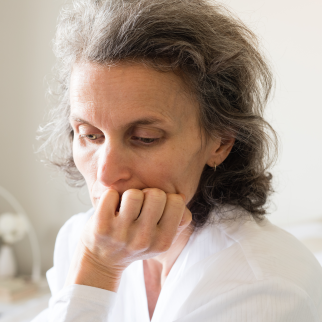CBD Oil For Sleep Apnea: Can I Manage Symptoms and Get Better Sleep

Posted on January 27th, 2021
Not everyone gets to enjoy uninterrupted sleep every night. Every once in a while, you may end up feeling tired or cranky after a night’s sleep. This may be brought about by inadequate sleep. For nearly 50 million Americans, sleep disorders make their day-to-day lives challenging. Sleep apnea is a sleeping disorder affecting an estimated 18 million Americans making it one of the top sleep disorders in the US. It can substantially affect an individual’s ability to perform everyday tasks. Today, awareness of sleep apnea is increasing dramatically. Research is undergoing to develop alternative treatments for this condition. CBD oil for sleep apnea may be one such effective remedy. But first, let’s find out what sleep apnea is precisely.
What Is Sleep Apnea?
Apnea is a Greek word that implies “want to breathe.” Sleep apnea happens when your breathing starts and stops repeatedly as you sleep. It may sometimes happen hundreds of times while you are asleep. Your brain and body may end up not getting adequate oxygen if you have sleep apnea. You might have this condition if you always feel tired and cranky even after a full night’s sleep.
Types Of Sleep Apnea
The primary types of sleep apnea are:
-Obstructive sleep apnea (OSA)
This type of sleep apnea happens when throat muscles relax. It occurs when the airway in the throat becomes blocked, causing temporary breath lapses. Typically, the soft tissue within the throat collapses, leading to obstructive sleep apnea.
-Central sleep apnea
In central sleep apnea, there is no blockage of the airway in the throat. Shallower and slower breathing happens because the brain fails to transmit proper signals to the muscles involved in breathing.
– Complex sleep apnea syndrome/Treatment-emergent central sleep apnea
This condition occurs when an individual has both central sleep apnea and obstructive sleep apnea.
 Symptoms of Sleep Apnea
Symptoms of Sleep Apnea
Central and obstructive sleep apnea share similar symptoms, making it difficult to determine the type of sleep apnea one has. Some of the most common symptoms include:
– Irritability
– Loud snoring
– Morning headache
– Insomnia
– Decreased libido
– Lack of concentration while awake
– Gasping to breathe while sleeping
– Extreme daytime sleepiness
Additional symptoms linked to obstructive sleep apnea include:
– Waking up frequently at night to urinate
– Dry mouth
The most common symptom of obstructive sleep apnea is chronic snoring. However, you should realize that not all individuals that snore suffer from sleep apnea.
Generally, an individual with sleep apnea doesn’t realize they have breathing difficulties at night. They become aware of this issue from their families, bed partners, or roommates. For people that live alone, extreme daytime sleepiness is a tell-tale sign of sleep apnea. These symptoms are why people reach for CBD for sleep apnea.
Causes Of Sleep Apnea
Medical conditions or an individual’s physical structure may contribute to sleep apnea. Certain risk factors increase the risk of airway blockage, including:
– Physical characteristics: The size as well as placement of one’s tongue, neck, tonsils, and jaw can directly influence airflow.
– Nasal congestion: You risk experiencing OSA if you have nasal congestion. Congestion restricts the flow of air into and out of the nose.
– Obesity: Obesity is one of the leading causes of OSA. It contributes to the narrowing of one’s airway, which in turn can result in sleep apnea. Increased fat deposits within the neck can affect airflow.
– Genetics: You risk developing OSA if one or more close members of your family have OSA.
– Sedatives: Tissues in the throat relax when you use sedatives, including alcohol. This makes it easier for airway obstruction.
– Smoking: Heavy smokers have a higher risk of developing OSA than non-smokers.
On the other hand, CSA can be linked to an underlying condition like a brain infection, a stroke, or a tumor in the brain that harms the brain stem. The breathing process may also be impeded when an individual uses pain medications such as opioids. An indirect reason CBD for sleep apnea can work is to decrease opioid use and possible addiction. Some of the risk factors for central sleep apnea are:
– Heart conditions
– Being male
– Age: Older people have a higher risk of developing CSA.
Complications From Sleep Apnea
You risk developing the following conditions if you have sleep apnea:
– Eye disorders
– Asthma
– Pregnancy complications
– Stroke
– Dementia
– Cognitive challenges such as memory problems and inability to focus
 Treatment Options
Treatment Options
You should consult a doctor if you have sleep apnea symptoms. Your doctor may recommend specific treatment options, or even CBD oil for sleep apnea, to help manage your condition. Remember, treatment for this condition varies from one individual to another. Losing weight and alcohol avoidance are some effective ways to deal with sleep apnea.
Here are some of the treatment options for sleep apnea:
– Continuous Positive Airway Pressure (CPAP)
CPAP therapy involves the use of a breathing mask while sleeping. It helps to restrict the blockage of the airway, guaranteeing continuous airflow. It provides positive pressure air to keep the airway open. CPAP is effective for OSA. This mask can also help relieve nasal symptoms by adding moisture through the device’s settings.
– Bilevel positive airway pressure (BPAP)
BPAP and CPAP share similarities even though this procedure uses a tiny sensor that monitors the air discharged into the breathing mask. The device releases air when one suffers OSA, thereby clearing the obstruction.
– Adaptive Servo-Ventilation
The adjustment of airflow is done through a device that monitors breathing. If any irregular breathing is detected, the device makes the necessary adjustments.
– Medications
Drugs such as theophylline and acetazolamide can help stimulate respiration in individuals with CSA.
 CBD Oil For Sleep Apnea
CBD Oil For Sleep Apnea
Treatment options for sleep apnea are growing steadily due to its potential severity. CBD oil is now popular among many patients suffering from sleep apnea. Cannabidiol and the endocannabinoid system play a vital role in the body’s homeostasis. CBD helps balance your ECS, thereby regulating physiological and psychological processes like sleep and other cognitive functions.
The ECS regulates the body’s ability to fall asleep, remain asleep, and wake up. Sleep plays a significant role in your everyday health. Aspects like blood pressure, immunity, and cognitive abilities are altered when one experiences an impaired sleep cycle or sleep apnea.
CBD helps your body’s rejuvenation process during sleep. It can boost your ability to recover from stress quickly. CBD oil also has the potential of treating insomnia. The administration of CBD may have different sleep effects based on the dosage. A high dosage of CBD has a sedating effect, while a low dosage has a stimulating effect.
Sleep scores of 48 participants administered with CBD improved over the first month. This clinical trial had 72 participants and it sought to determine whether CBD can help to improve sleep. It was determined that CBD might be the key to anxiety-related disorders.
Further research into CBD oil for sleep apnea needs to take place to label this cannabinoid an effective sleep apnea treatment. CBD may not fix all your breathing challenges, but it can provide you with sleep apnea relief. CBD oil is an effective way of managing some of the symptoms of sleep apnea.
Is CBD Oil For Sleep Apnea the Answer?
CBD oil may help manage the symptoms of sleep apnea, including headaches. Unlike aspirin and other medications with negative side effects, CBD can provide pain relief to manage headaches. According to studies, CBD is a more effective remedy for pain relief compared to aspirin. This makes CBD oil the best solution for your sleep apnea headache.
People suffering from sleep apnea usually experience anxiety and depression. CBD oil can be vital in managing these two conditions that can affect one’s mental health by promoting serotonin release. This hormone helps to improve mood and lower stress levels. Its stress-relieving properties don’t come with the side effects of anxiety medications.
When consumed in the right dose, CBD oil can help promote sleep. You may find it easier to sleep, given CBD interacts with receptors linked to sleep. Studies show that CBD can promote more restful sleep, ensuring you feel more energetic during the day. CBD can also boost one’s awareness and alertness during the daytime when taken in reasonable doses. This can make it easier for one to feel energetic while performing everyday duties.
 Dosage of CBD Oil for Sleep Apnea
Dosage of CBD Oil for Sleep Apnea
There is no standard dosage of CBD oil for sleep apnea. It varies from one person to another. This dosage may depend on your weight. Make sure you consult your physician before you supplement CBD oil to treat sleep apnea. Still, make sure you follow the prescribed dosage to enjoy the benefits of CBD oil.
Conclusion
Sleep apnea is a disorder that affects 1 in every 15 Americans. This disorder can affect one’s day-to-day life, making it difficult for an individual to perform tasks. Its signs and symptoms include depression and dry mouth.
At Tanasi, we have the best full-spectrum CBD oils to help you in the management of sleep apnea. Our products are made from the finest ingredients, guaranteeing optimal effectiveness. You can supplement your sleep apnea treatment with CBD oil without expecting the side effects of traditional medications. Our hemp extracts can help manage your mood and improve your sleep cycle.

Related Posts in CBD for Sleep

Sep 9 2021
Has Menopause Affected the Quality of Your Sleep? CBD for Sleep Could Help!
Read More →
Jul 5 2021
CBD Pills and Sleeping Pills: Here’s What You Need to Know
Read More →
May 16 2021
The CBD Oil Dosage for Sleep: What Could Help You Rest to the Fullest?
Read More →
Mar 21 2021

